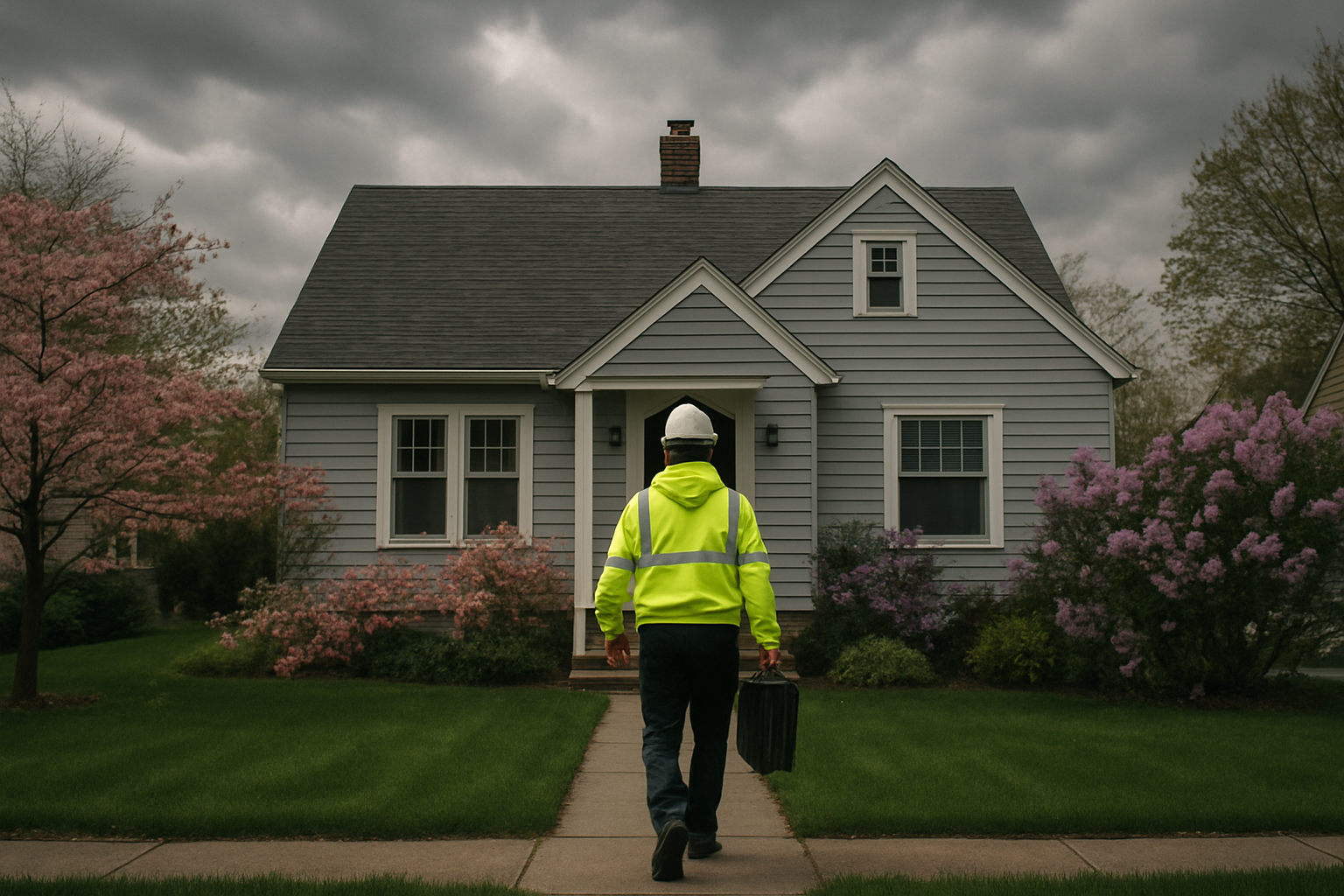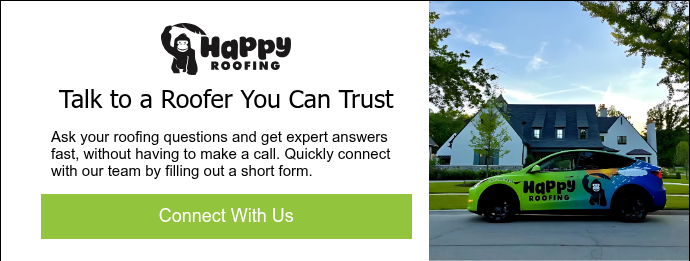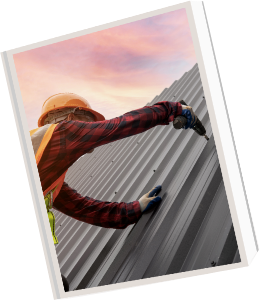What You Need To Know If A Roofer Knocked on Your Door After a Storm

A major storm blows through your neighborhood, and before you've even had time to assess the damage, there's a roofer knocking at your door.
They might claim your roof has storm damage, that they can work directly with your insurance, or that you need to act immediately to avoid losing coverage. At first, it may sound helpful, but it can also feel pushy, confusing, and even a little suspicious.
How do you know if the roofer is legitimate? And what's the smartest way to protect your home and wallet in this situation?
At Happy Roofing, we've worked with countless homeowners who have been approached by door-to-door roofers after storms. Some were reputable, but the majority of these "storm chasers" don't have your best interests in mind.
In this article, we'll cover exactly what to do if a roofer knocks on your door after a storm, including:
- Red flags that signal a roofer may not be trustworthy
- How to tell if your roof really needs attention
- Steps to protect yourself against predatory contractors
You'll learn how to handle these situations with confidence and avoid being pressured into costly mistakes.
Table of Contents
- Why Some Roofing Contractors Knock After Storms
- How to Tell if a Roofing Contractor is Legitimate
- Should You Let a Contractor Who Knocked on Your Door Inspect Your Roof?
- Can a Contractor Waive Your Insurance Deductible?
- What to Do if Your Roof Has Storm Damage
- How to Verify Claims That Your Roof Has Storm Damage
Why Do Roofing Companies Show Up After Storms?
Roofers show up after storms because severe weather leads to a spike in insurance claims, and that creates an opportunity for repair work. Some companies send teams door-to-door in affected neighborhoods, offering quick inspections and promising to "work with your insurance."
This practice is legal in Illinois, and in some cases, it can even be helpful. A reputable roofer might notice obvious storm damage you haven't seen yet, or help you file a claim correctly so you don't miss out on coverage.
But not all roofers who knock on your door are created equal. After every storm, there's a mix of:
- The good: Local, established roofing companies legitimately trying to help neighbors in need.
- The bad: Pushy contractors who exaggerate damage or pressure you into signing paperwork on the spot.
- Storm chasers: Out-of-town roofing crews chasing storms, who may not be local to your area. This often leaves you with poor workmanship and no one to call if problems arise.
- It isn't fair to assume every door-knocking roofer is a scam, but knowing how to spot the untrustworthy contractors can benefit you and your wallet.
How Can I Tell if a Roofing Contractor is Legitimate?
Before you let anyone on your roof, you can separate the trustworthy companies from the red flags by asking a few questions and looking for key signs of authenticity, like marked vehicles and a local presence.
Ask These Questions Before You Even Talk About Your Roof:
- Are you licensed and insured? A reputable roofer will have no problem showing proof of both. This protects you from liability if an accident happens on your property. You can verify their license on the state's IDFPR License Lookup page, and confirm insurance coverage with their provider if you need additional peace of mind.
- Can you show me recent local work? Ask for photos of projects completed nearby in the past 6–12 months, or any customer testimonials they may have. It helps to look at local reviews on sites like Google and Facebook to get a sense for how trustworthy the company is.
- How long have you been in the area? Storm chasers often follow the weather, and can come from areas that aren't even in your state. A company with roots in the community is more likely to stand behind its work and be there if you need any help or have questions after the project is completed.
If the contractor shows up at your doorstep in an unmarked personal vehicle, they're from out of state, or they're using pushy sales tactics to steer you into an immediate decision, it's an indicator that they may not be honest about their intentions.
Should I Let a Door Knocker Inspect My Roof?
It's okay to let a roofer who knocks on your door inspect your roof, but only if you set the right boundaries. A quick inspection can reveal storm damage you might have missed, but you should always protect yourself in the process to make sure that their claims are legitimate.
When Is It Safe to Agree to an Inspection?
If your area just experienced heavy storms with strong winds, hail, or both, it may be a good idea to check if your roof took any damage. Older roofs that haven't had inspections in over 5 years could also benefit from routine checks.
When It Makes Sense to Get a Roof Inspection
| Situation | Why a Roof Inspection May Benefit You |
| The contractor is local, licensed, and insured | Trustworthy, established roofers with a local presence are more likely to offer honest assessments and stand behind their work. |
| You’ll be home and able to oversee the inspection | Being present ensures transparency and helps you verify any findings firsthand with photo or video documentation. |
| Your area just experienced a major storm (strong winds, hail, or heavy rain) | A quick inspection can help identify storm-related damage early before it worsens or voids insurance coverage. |
| You’ve noticed visible signs of potential damage (missing shingles, debris on the ground, or leaks in the attic) | If you already suspect damage, allowing a professional to confirm it can give you peace of mind and help guide next steps. |
| Your roof is over 5 years old and hasn’t been inspected recently | Regular inspections help spot wear and tear, loose shingles, or early signs of leaks before they become costly repairs. |
If you decide to allow an inspection from a roofer who knocked on your door, make sure you:
- Are home during the inspection: This gives you a chance to oversee their inspection and prevents contractors from making claims about "damage" you can't verify.
- Request photos or video evidence: Don't rely on verbal descriptions. Ask for visual documentation of any damage they claim to find.
- Get their findings in writing: Before they climb on your roof, ask them what they'll be looking for and to provide a written summary of their findings afterward.
Too many homeowners have been pressured into signing repair contracts based on vague claims of damage they never saw for themselves. By insisting on photos, written findings, and transparency, you maintain control of the process and ensure that you're making decisions based on facts and not someone trying to get you to agree to unnecessary repairs.
What if a Roofer Offers to Waive My Insurance Deductible?
This practice is illegal in Illinois, and you should never agree to it, but it doesn't stop some contractors from resorting to the shady tactic. We've heard from homeowners that some door-knockers offer to "waive your deductible" as an incentive to work with them.
Why Can't a Contractor Waive Your Deductible?
Waiving a homeowner's insurance deductible is frequently illegal, or at least deeply unethical. Companies that promise it usually do so with workarounds that still put you at legal, financial, or claims risk.
Common workarounds door knockers may use to waive your deductible "legally:"
- Reimbursement after the job: The contractor will invoice the full amount, you pay the deductible, and then they will hand you a check or cash in the amount of that deductible. That alone can violate your insurance policy and make it harder to dispute poor work.
- Inflated line-item pricing: The contractor bills the insurer for more (or adds unnecessary work) and quietly uses the extra to cover your deductible. These distorted claims can be considered insurance fraud.
- Separate "discount" or "promo" contract: They present a second agreement or "discount coupon" that is meant to cover your deductible. This is a grey area and can be legally risky.
Agreeing to a waived deductible can void or complicate your insurance claim, leave you personally liable if something goes wrong, and reduce transparency around what was billed or paid. Without clear documentation, it also becomes much harder to contest a claim or hold a contractor accountable later.
A reputable contractor will explain the insurance process, show you documentation, and never pressure you into a questionable "deductible waiver."
How Can I Deal With Storm Damage Wisely?
If the contractor is saying that your roof has been damaged, the best thing to do is verify their claims. Even if your roof really does need work, you're under no obligation to sign anything on the spot.
Here's how to handle the situation wisely:
- Get a Second Opinion: Storm damage can feel urgent, but you always have time to verify. Even if you plan on going through your insurance, most insurers allow between 6-12 months to file a claim for any damages. That gives you time to schedule an inspection with a trusted local roofing company to confirm the findings before making any decisions.
- Ask for Photos or Video Proof: If they claim your roof has damage, ask to see photos or videos of where the damage is. Visual proof can give you a clearer picture and protect you from vague or exaggerated claims.
- Contact Your Insurance Company Directly: Never let a roofer "handle everything with your insurance" without your involvement. Some contractors push unnecessary upgrades or inflate damage reports (insurance fraud), leaving you legally and financially responsible. Others may negotiate an insurance payout that benefits them more than you, using cheaper materials or cutting corners while still charging your insurer. By calling your insurance company yourself, reporting the damage, and following their process, you stay in control and protect yourself from shady practices.
- Compare Their Quote With Others: Even if damage is confirmed, compare quotes from multiple contractors. Look for differences in the scope of work, materials, and warranties. It's a good idea to review their past jobs and get a sense for their quality of workmanship.
A door-knocking roofer might be the first to point out possible storm damage, but their word should never be the only one you rely on. Always verify with a trusted local contractor, ask for photo documentation, and compare quotes before making any decisions.
You should never feel rushed into any roof work or forced to sign any confusing documents like an Assignment of Benefits.
What is an Assignment of Benefits?
While an Assignment of Benefits (AOB) can be legitimate, they hand full control of the insurance claim to the roofer, meaning they decide how the claim is handled, what's billed, and how the money is used.
Some contractors push homeowners to sign an Assignment of Benefits after a storm, claiming it will make the process easier. This can lead to inflated invoices, unnecessary repairs, or even lawsuits filed in your name without your knowledge.
Should I Sign an Assignment of Benefits?
In most cases, you should avoid signing an Assignment of Benefits (AOB) for roofing work. An AOB is a legal document that transfers your insurance rights from you to the contractor, giving them the power to deal with your insurer directly.
The safest approach? Stay in control of your claim by working directly with your insurance company and keeping all contracts in your own name.
How to Verify Claims of Storm Damage
If a roofer has knocked on your door after a storm, it's not an immediate red flag, but you should look out for common tactics meant to misinform or trick you into scheduling unnecessary work.
The good news is that you don't have to make these decisions under pressure. Scheduling a follow-up inspection with a local, reputable roofing contractor can help you uncover what your roof needs without any pressure.
Not sure if your roof has true storm damage or just signs of age? We've put together this article to help you spot the key differences: Storm Damage or Normal Wear? Learn What Insurance Will—and Won't—Cover.
If you've received a quote from a door knocker and want to double-check their claims, we offer non-commitment roof inspections to give you a clear and unbiased picture of your roof's health.
The Author: Pedro Toledano
Happy Roofing is a trusted roofing company dedicated to providing top-quality roofing services to residential and commercial clients. With years of experience, they specialize in roof installations, repairs, and maintenance, ensuring durability and customer satisfaction. The team is known for their professional approach, timely service, and attention to detail. Happy Roofing prides itself on using high-quality materials and offering competitive pricing. Follow their Facebook page for updates on projects, customer testimonials, and tips on maintaining your roof in excellent condition.





